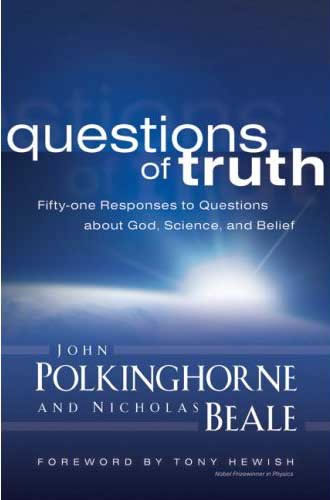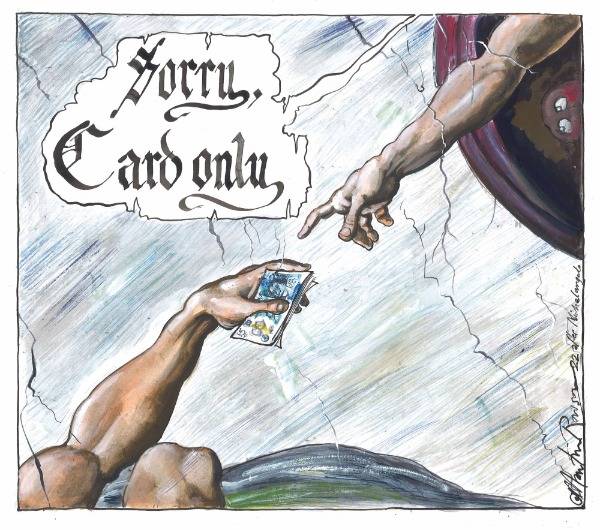 John Polkinghorne's former student Nicholas Beale runs a website on behalf of his mentor, on which questions about religion, and the relation of religion to science, can be posted. This apparently self-published book is a compilation of 51 of these website questions with Beale's and sometimes Polkinghorne's answers. The questions range over creation, the existence of evil, evolution, intelligent design and most of the other familiar old debating points, plus "How does the death of Jesus save the world?", "Why believe Jesus rose from the dead?" and "How much do you need to believe to be a Christian?"
John Polkinghorne's former student Nicholas Beale runs a website on behalf of his mentor, on which questions about religion, and the relation of religion to science, can be posted. This apparently self-published book is a compilation of 51 of these website questions with Beale's and sometimes Polkinghorne's answers. The questions range over creation, the existence of evil, evolution, intelligent design and most of the other familiar old debating points, plus "How does the death of Jesus save the world?", "Why believe Jesus rose from the dead?" and "How much do you need to believe to be a Christian?"
Since these latter questions premise membership of the asylum already, I shall focus just on the various questions that touch on the relation of science and religion, because the interest attaching to Polkinghorne is that he is a physicist who became a Church of England vicar, which makes people think that he has a special line into the science-religion question. Were he a vicar who gave up the Church of England to become a physicist he would not be regarded as anything more special than sensible; but this is how the world wags.
It is needless to itemise the questions and their answers, because the former are, as noted, the all-too-familiar ones, and the answers given by the composite Beale-Polkinghorne author are very familiar too. In fact they come down to the tired old three: god-of-the-gaps, argument-to-the-best-explanation and "religion and science both seek the truth but in different domains". And of course Beale-Polkinghorne milk the tendentious version of the Anthropic Principle which has it that the constants of nature are fine-tuned in order that we can exist.
The gaps-god and best-explanation strategies (which both come down to "we don't know the answer so let's say Fred did it") can be left to sink in the murk of their own fatuity; undergraduates cut their teeth on refuting them. As for the Anthropic Principle: well, it passes belief that it can still be trotted out in this guise. The argument that the universe exists for the express purpose of making the existence of humans possible has long since been debunked, and it is discreditable of Beale-Polkinghorne to try to pass it off on the unsuspecting.
In case you need reminding, the point can be illustrated as follows: I would not be writing this on a laptop if computers had not been invented, but this does not prove that computers were invented so that I could write this.
So let us dwell instead on the "truth but in different domains" manoeuvre.
To get this to work you have to cherry-pick which bits of scripture and dogma are to be taken as symbolic and which as literally true - so: Genesis is symbolic, the resurrection of Jesus literally true - the chief criterion being convenience, with the resurrection as a bit of necessary dogma whose violations of biological laws you just have to shrug your shoulders over. But you only do the cherry-picking and reinterpreting to the religious sources; science is not so easy to treat in this way. The rule appears to be that where science and religion directly conflict - about the origin of the universe, let us say - the religious tale (Genesis) gets turned into symbol, thus sidestepping the possibility of direct and testable confrontation. And indeed there is no possible test of religious claims; again conveniently, "God will not be tested."
Moreover, as Beale-Polkinghorne exquisitely show, they can by this technique of evasion, rewriting, special pleading, Jesuitry and speciousness provide a religion-consistent answer to every question and every objection: which reminds one of Popper's telling remark, "A theory that is consistent with everything explains nothing."
Thus in short, on the religious side of things you make up truth as you go along, by interpreting and reinterpreting scripture to suit your needs and to avoid refutation by confrontation with plain fact; and thus it is that Beale-Polkinghorne can claim that both science and religion seek truth. I would call this dishonest if I did not think it is in fact delusion, which - since a kind of lunatic sincerity is involved - it rather palpably shows itself to be. And it happens that "lunatic" is appropriate here, for the painful experience of wading through this book gave me an epiphany: that religious faith is extremely similar to the kind of conspiracy theory that sufferers from paranoid delusions can hold: the faithful see a purposive hand in everything, plotting and controlling and guiding - and interpret all their experience accordingly.
I found the Beale-Polkinghorne explanation of natural evil (tsunamis and earthquakes that drown or crush tens of thousands, childhood cancers, and other marks of benign providence) as disgusting, though it is novel, as any that other apologists trot out. They say that the deity allows natural evils to happen because "he" has given creation "freedom to be and to make itself" - thus imputing free will to "creation" to explain natural evil in the same way as moral evil is imputed to the free will of humans. Heroic stuff.
And of course Beale-Polkinghorne have to be mind-brain dualists (see their chapter on this, in which their dualism is described in their own version of Newspeak as "dual aspect monism" in which "mind and brain are not identical" - work that one out!) in order for them to keep a place for the concept of "soul", itself explained in a cloud of fudge by analogy with piano and the music played on it: "...layers...indeterminism...er...Penrose...chaos theory...quantum mechanics...er...blah blah...see my book chapter 9, all rather complicated..."
Indeed. What is not complicated, though, is the scandal that the Royal Society is allowing its premises to be used for the launch of this book. The accompanying publicity material has in the small print the statement, "This book is being launched at (not by) the Royal Society..." Indeed again. No doubt the Royal Society required this disclaimer to be entered somewhere, having reluctantly and uncomfortably felt that it had to give one of its Fellows (Polkinghorne was made one before becoming a vicar) use of its facilities because he asked. Of course the point is that Beale-Polkinghorne and their tuppence-halfpenny religious publishers wish to get as much of the respectability of the Royal Society rubbed off on them as they can. This is the strategy adopted by the Templeton Foundation too, of sidling up to proper scientists and scientific establishments and getting their sticky religious fingers on to respectable coat-sleeves in the hope of furthering their agenda - which, to repeat what must endlessly be repeated in these circumstances, is to have the superstitious lucubrations of illiterate goatherds living several thousand years ago given the same credibility as contemporary scientific research.
Polkinghorne dishonours the Royal Society by exploiting his Fellowship to publicise this weak, casuistical and tendentious pamphlet on its precincts, and the Royal Society does itself no favours by allowing Polkinghorne to do it. The Royal Society should insist that, as it is the country's one principal institution that exists to serve science, and as there are hundreds of other places where theology and religion are the staple and main point, there will be no more special pleading for and insinuation of religion by religious apologists within its doors.
Questions of Truth is published by Westminster John Knox

